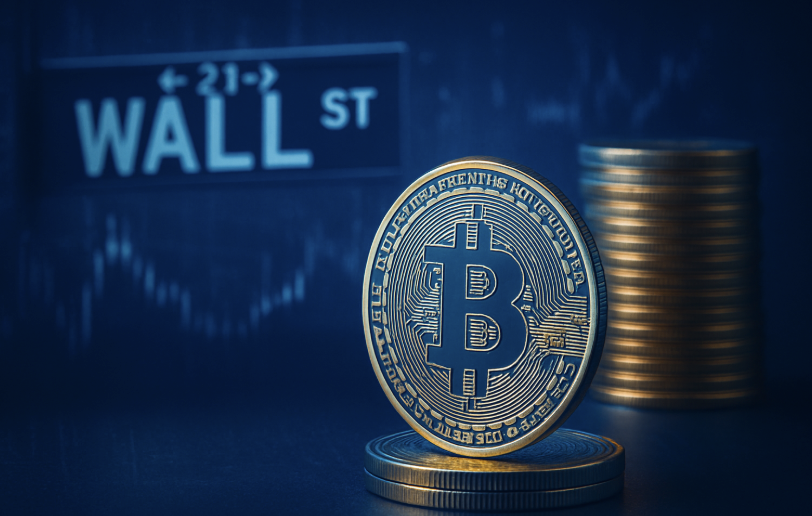Prefer to view this content on our website? Click here.
Dear Fellow Investor,
The Biggest Reasons the World Must Prepare for a Post-Quantum World
Quantum computing isn’t just another step forward in technology — it’s a revolution in how the world processes information.
For decades, computers have operated on binary logic — bits that exist as either a 0 or a 1. But quantum computers operate on qubits, which can represent both 0 and 1 at the same time. This ability to exist in multiple states simultaneously — known as superposition — allows them to perform calculations exponentially faster than any traditional supercomputer.
In simple terms: what takes today’s fastest machines years to compute, quantum computers could solve in seconds.
And that changes everything.
A Trillion-Dollar Opportunity
According to McKinsey & Company, quantum computing could take computing — and our ability to solve previously impossible problems — to “a whole new level.” They estimate it could unlock as much as $1.3 trillion in economic value by 2035 across industries ranging from pharmaceuticals and finance to logistics and energy.
This isn’t just theoretical hype. Governments, corporations, and startups are all racing to claim a slice of the quantum pie.
Tech giants like IBM, Google, Microsoft, and Amazon are investing billions in developing quantum hardware and cloud-based quantum computing services. Startups like Rigetti, IonQ, and D-Wave are pioneering different architectures — each one competing to deliver the first scalable, commercially viable quantum computer.
Charlie Campbell of Time summed up the magnitude perfectly: “Complex problems that currently take the most powerful supercomputer several years could potentially be solved in seconds.”
That leap could open “hitherto unfathomable frontiers in mathematics and science, helping to solve existential challenges like climate change, food security, and medical discovery.”
Quantum Power, Real-World Impact
Imagine being able to model new drugs at the molecular level in days instead of years — potentially accelerating the fight against diseases like cancer, Alzheimer’s, and Parkinson’s.
Or optimizing global supply chains with near-perfect efficiency, cutting waste and reducing carbon emissions.
Or processing complex financial data and risk models in real time, giving investors, banks, and insurance firms an entirely new level of predictive insight.
Quantum computing could make all that possible.
In other words, this isn’t just another incremental improvement in computing power — it’s a paradigm shift that could reshape industries, economies, and national security.
But that same power comes with a dark side.
Altimetry
Elon calling
I was recently in the room as Elon Musk revealed his most radical plan yet ... to a small audience in California.
My team spent over $20,000 just to attend a small summit he spoke at.
What we heard confirmed a story we've been tracking since January.
That Elon's preparing to launch a new product that could reshape Tesla forever... potentially making him the richest man in history.
He hasn't returned to D.C. since May ... and I believe that silence is hiding something huge.
On November 6, I expect what I'm calling a "Tesla Shock" – a market event with the power to ripple through hundreds of stocks.
Tesla insiders are calling this a "critical inflection point." Elon himself says it "may affect the future of the world."
I believe it could also unlock a 1,000% opportunity for prepared investors.
Click here to see the full details on what Elon's planning.
The Coming Threat: “Q-Day”
For all the good quantum computing can do, it also poses a massive cybersecurity risk.
Because quantum computers are so powerful, they can break through today’s encryption standards — the very protocols that secure our banking systems, government communications, cryptocurrencies, and AI models.
Experts have a name for this moment: Q-Day — the day quantum computers become powerful enough to crack the encryption protecting most of the world’s sensitive data.
Right now, modern encryption methods (like RSA and ECC) rely on the difficulty of factoring enormous numbers — something that would take classical computers thousands of years. But quantum computers can use algorithms like Shor’s algorithm to do it almost instantly.
That means once Q-Day arrives, every encrypted email, digital transaction, and private database could be vulnerable — even retroactively. Hackers or adversarial nations could already be harvesting encrypted data now, waiting to decrypt it later once quantum power is available.
As Marisol Cruz Cain, Director of Information Technology and Cybersecurity at the U.S. Government Accountability Office, warned:
“Quantum computers can threaten the security of information systems and the data they contain, including those controlled by the federal government. For instance, quantum computers could defeat widely used encryption methods that individuals, federal agencies, and critical infrastructure entities rely on.”
In short: the same technology that can cure diseases could also break the internet as we know it.
The Global Quantum Arms Race
That’s why the world’s superpowers — including the U.S., China, and members of the European Union — are locked in what some analysts call the Quantum Arms Race.
The U.S. has already launched its National Quantum Initiative Act, committing billions in funding toward research, education, and industry collaboration. Meanwhile, China has invested heavily in quantum communication networks and is believed to have made major advances in quantum satellite encryption.
The stakes are enormous. The first country to develop scalable, fault-tolerant quantum computers could have an unprecedented advantage in both technology and intelligence gathering.
That’s why the private sector is racing to develop “quantum-safe” encryption — new algorithms and standards that can withstand the immense computing power of a future quantum attack.
Preparing for the Post-Quantum Era
For investors, this transformation creates two massive opportunities:
-
Quantum Computing Itself — investing in the companies developing quantum hardware, software, and algorithms.
-
Quantum Cybersecurity — investing in companies building the next generation of encryption and digital protection.
While direct quantum computing investments (like IonQ or D-Wave) tend to be highly speculative, the cybersecurity side is far more actionable right now. As governments, banks, and corporations rush to prepare for Q-Day, spending on cybersecurity infrastructure is expected to soar.
NewMarket Health Publishing
RFK Jr to be fired?

On October 7, six former US Surgeon Generals published a letter trying to get RFK Jr. fired.
But I noticed something very interesting…
Most of them have direct ties to the $1.7 TRILLION pharmaceutical industry.
David Satcher served on the board of directors for Johnson & Johnson…
Jerome Adams serves on the board of directors for Atea Pharmaceuticals…
Richard Carmona served on the board of directors for McKesson…
Vivek Murthy founded a company to bring new drugs to market faster…
It makes you wonder…
What are they all so darn worried about?
Is it because you might find out about THIS?
Before the Deep State’s smear campaign works, see RFK Jr’s warning [HERE] of a new hidden epidemic.
How to Trade It: Cybersecurity ETFs
One of the simplest ways to gain exposure to this theme is through cybersecurity ETFs, which include a wide range of companies positioned to benefit from quantum threats and digital security expansion.
ETF: Global X Cybersecurity ETF (SYM: BUG)
The Global X Cybersecurity ETF focuses on firms developing and managing technologies to prevent system and data intrusions. According to Global X, the fund “seeks to invest in companies that stand to potentially benefit from the increased adoption of cybersecurity technology, such as those whose principal business is in the development and management of security protocols preventing intrusion and attacks to systems, networks, applications, computers, and mobile devices.”
That includes major players like Palo Alto Networks, Fortinet, and CrowdStrike, which are expanding rapidly as corporate and government clients upgrade their digital defenses.
ETF: iShares Cybersecurity and Tech ETF (SYM: IHAK)
The iShares Cybersecurity and Tech ETF provides similar exposure, tracking an index of developed and emerging market firms involved in cybersecurity hardware, software, and services.
It holds positions in leaders such as Zscaler, Cisco Systems, and Okta, all of which play key roles in cloud security, network protection, and identity management.
As quantum computing inches closer to real-world deployment, these ETFs could benefit not only from increased spending on data protection, but also from long-term structural growth in the global cybersecurity market — which is expected to surpass $500 billion annually by the early 2030s.
The Bottom Line
Quantum computing is coming — whether we’re ready or not.
It holds the power to redefine science, business, and security in ways that will reshape the global economy. But it also demands new systems, new standards, and new investments to keep our digital world secure.
For investors, that duality — massive potential meets massive disruption — is what makes the post-quantum era so compelling.
While the hardware race plays out in labs across Silicon Valley and Beijing, the opportunity for investors right now lies in the companies protecting the world from the risks of that coming quantum leap.
Because once Q-Day arrives, it’ll already be too late to prepare.
Crypto 101
Wall Street's Secret Crypto Accumulation Exposed

The crypto market is heating up as tariff tensions fade, and institutions are quietly buying up one financial token before retail catches on. This protocol is fueling billions in transactions while most investors chase headlines… creating what could be the most asymmetric opportunity of 2025!
Revealed: Get the name of Wall Street's favorite crypto for just $3 before it potentially skyrockets!
Are there any other quantum computing stocks you've heard about? What other kinds of emerging tech stocks are you interested in? What sectors of the market do you think are on their way up right now? Hit "reply" to this email and let us know your thoughts!